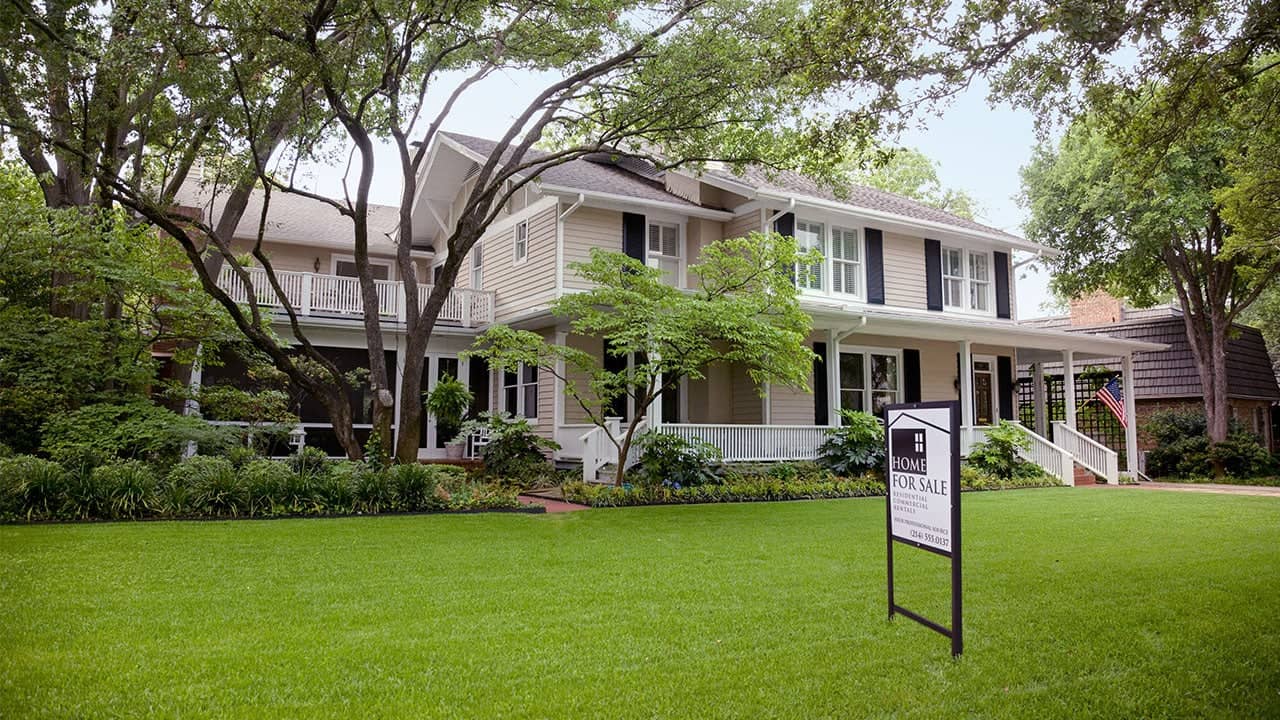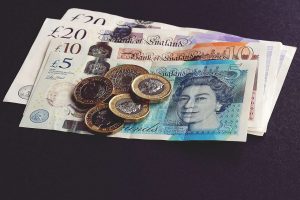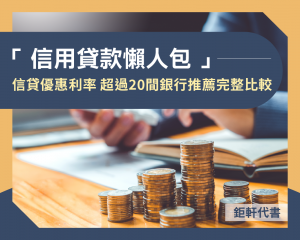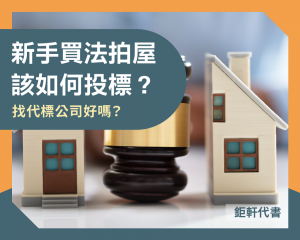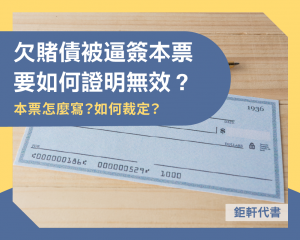How to Buy a House: The Loan (Mortgage)
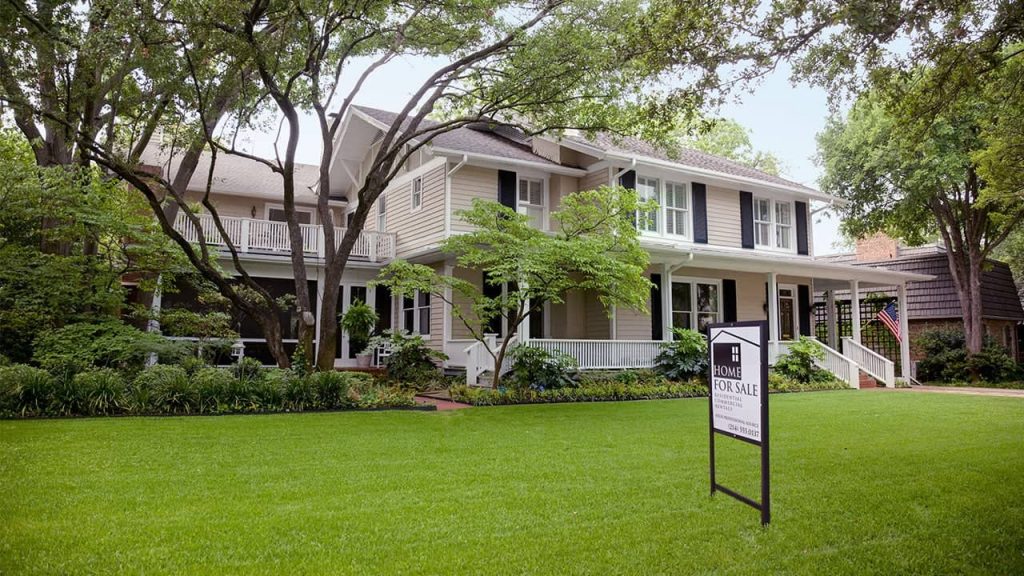
How to Buy a House: The Loan (Mortgage)
(We’ll talk more about how to get a loan in a minute.) The bank loaning the money is the lender. The amount you pay to the bank each month is your mortgage payment. The rate of interest on the loan is the mortgage rate (or the interest rate). If you don’t make your mortgage payments then the bank will repossess the house.
Can You Buy A House With Cash And Then Get A Mortgage?
That’s why some buyers are turning to a unique solution to better compete when multiple offers are on the table: paying with cash now, then getting a mortgage later. Sound complicated? It is. Here’s how it works and what you should consider.
1. Why cash is still king in competitive real estate markets
Here’s the strategy: Buyers liquidate their assets, amass enough cash to purchase the home outright, and then put in an offer as an all-cash buyer. For sellers, all-cash offers are more attractive than ones from buyers who need to finance the purchase. Cash deals mean fewer contingencies — mainly, the sale of the home is contingent upon the buyer getting the mortgage, and there’s no guarantee that will happen. For instance, the sale could fall through if something goes wrong during the underwriting process. The sale is also contingent upon a home inspection and appraisal if the buyer finances the purchase, and again, a number of issues could come up that may make your lender (and you) pause. Plus, all-cash deals tend to close more quickly and with fewer overall complications than a sale that depends on financing.
2. A new buying strategy: cash first, mortgage later
Buyers are using the cash first, mortgage later strategy to circumvent these contingencies. They still finance their home with a mortgage, but they delay that process until after the sale is final. “With prior proper planning, a buyer could conceivably offer a 24-hour closing,” says Dennis Crowley, principal of Vitruvius Capital Consultants. Before opening his own firm, Crowley served as a private banker and helped buyers use this strategy to purchase homes.
There are downsides, however, to this tactic. “You’re using marketable securities as collateral,” Crowley warns. “This means that the buyer and lender have agreed that the collateral is worth a certain amount, and that amount can change without notice.”
3. What to consider before liquidating your assets
This buying strategy isn’t right for everyone. “Use the same wisdom you’d apply to any other purchase,” Crowley advises. “Make decisions with facts and not emotions and understand your options thoroughly.” Instead of liquidating your assets and putting a lot of pressure on yourself to purchase a home, consider a new timeline for your homeownership goal — perhaps set a goal to buy in five years instead. By then, you’ll have saved up more cash and may not need to liquidate existing investments. Second, the real estate market could change during that time — making these extreme measures unnecessary.
But if you do your research and determine cash first, mortgage later is something you want to do, you need to know how it actually works. After all, not many buyers are trying the strategy, simply because they don’t know it’s an option.
4. How to buy with cash first and get your mortgage later
Some buyers take money out of their retirement savings. Others liquidate other investment accounts and various assets like other property or use cash savings. Buyers also turn to (generous) relatives to help gather the amount needed to cover the purchase price. Once you have enough cash, you purchase the home (woohoo!). Then you get a mortgage, using that loan amount to refill the accounts you depleted and pay back anyone who helped you gather the cash you needed to buy.
Of course, you need to be careful when dipping into retirement savings, like 401(k) and IRA accounts — it’s not always a wise move. You’ll be penalized for withdrawing funds before retirement age, so include those fees in the total cost of your mortgage if you want to fully pay back those accounts. And an important note: Crowley points out that trying to use your existing assets this way is not for people who want to borrow money they don’t have. The cash first, mortgage later option is intended for people who want to employ capital that they already have in the most efficient way, he says.
5. More factors to consider
Remember to evaluate your situation (and your assets) to determine whether buying this way is even an option. “A buyer with roughly 150% of their proposed purchase price in marketable securities brings these options into play,” Crowley says. “Failing that, a buyer who has at least 200% of a required down payment might consider these.”
An understanding of marketable securities is a prerequisite for this buying strategy. Crowley recommends finding the right lender too. Most mass-market lenders won’t be able to support the level of complexity required to help with the process from start to finish. “Most major brokerage firms offer these options. Some smaller firms do as well,” Crowley says. “Even some independent financial planners have access to such channels.”
The bottom line? Liquidating your assets to purchase a home with cash and delaying financing by taking out a mortgage after you buy is an interesting strategy — but not one that’s right for everyone. It can help keep your offer competitive when you’re trying to purchase a home, but you shouldn’t just liquidate all your assets to become a cash buyer. Use money you already have as leverage, and don’t try this strategy simply because you don’t currently have enough cash to put money down on a home or to buy a home outright.
Have you been a cash buyer for a house, then taken out a mortgage? Tell us about your experience in the comments!
How to Buy a House The Basics of Buying a House.
The Loan (aka, “The Mortgage”)
Basics
The loan you get from the bank is called a mortgage, also called a note. (We’ll talk more about how to get a loan in a minute.)
The bank loaning the money is the lender. The amount you pay to the bank each month is your mortgage payment. The rate of interest on the loan is the mortgage rate (or the interest rate).
If you don’t make your mortgage payments then the bank will repossess the house. (This is called foreclosure.) Then they’ll sell it to make sure that they can recoup the money they loaned to you, and that you didn’t pay back.
The number of years it takes to pay back the loan is called the term, which in the U.S. is either 15 or 30 years. There are pros and cons of each:
| 15-year mortgage | 30-year mortgage |
| • Saves a bundle on interest • Pay off the loan in half the time |
• Easier to qualify for • Lower monthly payments • Allows you to buy a higher-priced home • Keeps your cash liquid |
How do you choose between the two? If you want the most flexibility then take the 30-year loan. You can still save on interest and pay your loan off early by paying the bank a little extra each month (or whenever you can afford it). The difference is that with a 30-year loan you get to dictate how much extra you want to pay, and therefore how much you want to save. With a 15-year loan you have to make bigger payments every month whether you like it or not.
On the other hand, if you can definitely afford the payments on a 15-year loan, and you don’t trust yourself to make extra principal payments on a 30-year loan, then take the 15-year loan and enjoy the fact that you’ll save a bundle of interest and pay off the loan in half the time, without having to do anything special.
Paying back a mortgage
You pay back your loan by making a payment every month. At closing you’ll usually have the opportunity to sign a form which lets the bank draft the payment automatically from your bank account each month, which is very convenient. If you decline to do the auto-draft, then it’s your responsibility to make your payment each month on your own initiative. The bank won’t send you a monthly bill.
Part of your payment goes towards the principal (the amount the bank loaned you), and part of it is interest (the bank’s profit from lending you money). So when the bank loans you $100,000 you pay them back that $100,000 and then some. If you only had to pay back the same $100,000 they gave you then there wouldn’t be anything in it for them. That’s why they charge interest.
Even though part of your monthly payment is for principal and part is for interest, you make only one payment to the bank each month, and that payment amount stays the same for the life of the loan. You don’t have to know how much of your payment is for principal and how much is for interest, and you generally don’t need to know. At the end of the year the bank will send you a statement for your taxes (since you’ll get to deduct the interest you paid if you itemize), and the statement will tell you how much interest you paid over the year.
Mortgage interest
Interest is the fee you pay for the privilege of borrowing money. It’s how the bank makes a profit by giving you a loan. Naturally, the lower the interest rate, the better for you, because you’ll pay less total interest. And since the interest is part of your monthly payment, a lower interest rate means a lower monthly payment, too. Finally, a lower interest rate means you can afford a more expensive house. (Let’s say you’ve got $1500/mo. to pay towards a home. When less of that $1500 goes to interest, more of it can go towards paying off the cost of the home, which means you can afford a pricier house.) So when you get to the point where you’re shopping for a loan, you’ll try to get the lowest rate possible.
Incidentally, in June 2012, U.S. mortgage rates dropped to a record low of 3.66%, the lowest rate since 30-year mortgages started in the 1950s. (MSNBC) HSH has a list of historical mortgage rates since 1986.
Maybe you remember percentages from high school, so you figure that if you have a $100,000 loan at 6% you’ll be paying the bank back $106,000? Nice try, but that would work only if you paid back the loan after one year. The 6% rate is an annual rate, so you’re going to pay that 6% every year. (You won’t pay quite as much as $6000 x 30 though, because you pay interest only on the outstanding balance, not the original loan amount, and as time goes by your balance gets lower.)
The actual amount of interest you pay each month is the current outstanding balance, times the interest rate, divided by 12. (e.g., For $150,000 left on a loan at 6%, means you’d pay $150,000 x 6% ÷ 12 = $750 in interest for that month.) If your eyes just glazed over then don’t worry about it, it’s not important to know the math now, I just provide the details for those who want to understand everything completely. Here’s all you need to know:
- Over the life of the loan, you’ll be paying the bank a lot more than just the interest rate times the loan amount.
- When comparing loan offers from two different banks, just a single percentage point of difference means a big difference in how much interest is paid.
- For the first several years most of your payment goes to interest, not principal. On a 30-year, 7% mortgage, in year #15 over 75% of your monthly payment goes to interest and not equity. After 15 years you won’t own half your house, you’ll own only 27% of it.
Here are some pretty pictures to demonstrate the first two points. We’ll assume a $125,000 loan for 30 years at various interest rates.
Total Interest Paid Over the Life of the Loan
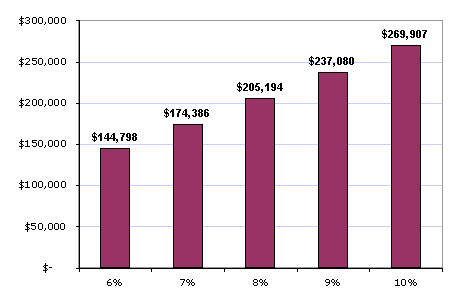
So even at a very low interest rate of 6%, you’re paying $145,000 in interest on a $125,000 loan. So you borrow $125,000 and pay back $270,000 — more than double what you borrowed!
It’s even worse if you have a higher interest rate. Note how going from a 6% to 10% interest rate means you pay an extra $125,000 over the life of the loan. So the total you’d pay on a $125,000 loan at 10% would be $125,000 principal + $269,907 interest = $394,907! Quite a lot to pay back for a $125,000 loan, huh?
Average Yearly Interest ($125,000 loan, 30 years)
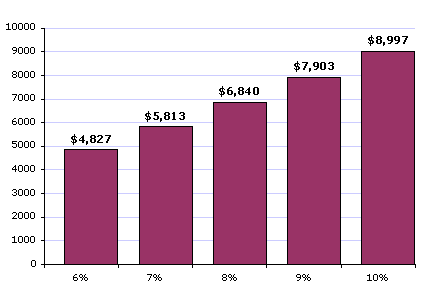
Here again, going from 6% to 10% interest means you pay an extra $4000 on average in interest each year!
How the interest rate affects the monthly payment
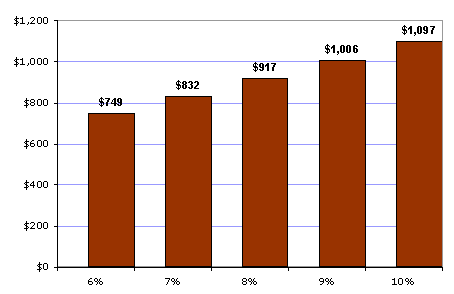
Types of loans
For the most part, you don’t have to concern yourself with the difference between the three main kinds of loans (Conventional, FHA, and VA loan). It’s your lender’s job to try to pick the best loan for your needs and qualifications, not yours. But since you’ll hear these terms bandied about frequently, you might want to know what they mean, so here ya go.
Conventional. This is a fancy word for “normal”. A conventional loan is just a regular, normal loan. If your credit is good and you can swing at least a 5% down payment, then it’s better than an FHA loan, since the fees are a lot lower, and there’s less red tape.
FHA. The U.S. government offers the FHA loan program to make home-buying easier. These loans are generally easier to qualify for, and can be had for down payments as low as 3.5% (vs. 5% for conventional loans). The loans aren’t actually made by the government, they’re still made by the banks; the feds just guarantee part of the loan if you default, which means that they pay the bank if you fail to make your payments. Don’t get excited about the government making your payments for you, though — if you fail to make your mortgage payments the bank will still take the house back from you. The feds pays the bank after the bank has already repossessed your house. Note that not all sellers will agree to an FHA loan, because there’s a little more red tape involved.
Also, one flavor of FHA loans is the FHA 203k, which will let you borrow any money needed for additional repairs or modernization. For example, if you’re buying a $170k home, and it needs $30k of repairs, you could borrow $200k through an FHA 203k. In fact, the FHA 203k is usually the only way you can borrow a lot of money for initial repairs. The downside is that the interest rate on such loans is about one percentage point higher.
VA. VA loans are an option for veterans, and it’s possible to put 0% down on one. Just like with FHA loans, the VA itself doesn’t lend money, it just guarantees part of the loan so lenders feel comfortable lending the money. VA-guaranteed loans can be combined with second mortgages (which is when the bank makes the main loan covering most of the price of the house, and the seller makes a separate loan to the buyer for the rest of the price.) VA loans can be assumed by any future qualified buyer, so your hands aren’t tied if you need to sell — you can sell to anybody, not just another veteran.

很遺憾,欠銀行錢是一種合約上的債務,必須根據協議進行還款。具體來說,逾期還款可能會導致額外的費用和利息,對信用評分造成負面影響,甚至會導致債務追討和訴訟。
如果你無法按照協議還款,建議盡早與銀行聯繫並討論可能的還款計劃或延期付款的方案,以免造成更大的財務損失和信用風險。
此外,銀行每隔一段時間會公布呆帳大戶,引起各方媒體記者注目,上億元呆帳戶紛紛曝光。但其實百萬小呆帳戶,銀行也不會放過的。民法雖然規定債權十五年,但是銀行續追呆帳,都會一直展延,只要走法院,時效可以一直延續,欠款不還錢,銀行『恐怖追殺令』真的會追你到天荒地老。

房貸詐騙!是貸款還是詐騙?
急需用錢更該小心!防止貸款詐騙3個方式說明!
國內消費者金融需求高漲,不過,投資詐騙案件卻也跟著暴增。對此,警政署165反詐騙以最近3個月比較,由消費者提報的「假貸款真詐騙」的案件數,11月比9月激增了整整4倍;警政署165呼籲民眾辨識三種新型態金融偽裝詐騙術,提升自我防詐抵抗力。
國內有3大新型態金融偽裝詐騙術
偽冒銀行或金融機構發送釣魚簡訊
誘騙民眾立即點開短連結,一旦上當點開網址,恐遭植入木馬程式,或歹徒以仿真網路銀行頁面側錄受害者銀行帳號、密碼,將受害者存款轉出至人頭帳戶。
詐騙集團有竄改來電顯示號碼的技術
恐以銀行代表號或是權威機構電話號碼向民眾要求帳戶操作或是搜集敏感資訊,一步步誘騙被害者上當。市話開頭002、009,或電話開頭+的來電,務必警覺。
偽裝成銀行行員來電提供優惠貸款方案
留下假的銀行聯絡電話作為餌,等待民眾回撥電話上鉤後,告知優惠名額已滿,須先支付手續費後才能核貸,騙取民眾錢財。
另外:不少第一手屋主持有逾20、30年,因為房屋已經沒有設定抵押貸款,可快速過戶、取得貸款甚至轉賣,反而成為詐騙集團鎖定目標。所以已經繳清房貸的屋主,倒不如別去塗銷抵押設定,讓有心人士看到謄本資料時,避免成為鎖定目標。
一般買房子,銀行申貸條件中多要求以「最高限額抵押權」設定,所以謄本上會顯示「最高限額抵押權」與「擔保債權總金額」,設定的金額會高於實際房貸。資深的鉅軒代書表示,銀行房貸還清時,原貸款銀行會提供清償證明及抵押相關證明文件,此時可將文件送至地政機關塗銷銀行的抵押設定。

如何選擇最適合自己的房貸方案,甚至結合儲蓄、保險等其他理財工具,為自己省下利息並增加保障,真的是一門大學問。以下步驟將協助你挑選最適合自己的房貸方案:
辦理銀行房貸時,你最在乎的是,哪家銀行的貸款利率最低嗎?其實,利率高低並不是唯一的考量!貸款期間長短、每月繳款負擔、要不要寬限期、自己的投資理財能力,都是需要考量的。而如果選對了房貸方案,不僅可以輕鬆繳款,還可能讓你多賺錢。最好遵守「335原則」:準備3成自備款,每月房貸支出不超過家庭總收入的3分之1,房屋總價不超過家庭年收入的5倍。不但輕鬆成家,也能讓資金運用更充裕。
- 貸款時別聽信低利誘惑,向非法單位辦理,請尋求專業合法單位辦理,以免掉進黑心業者圈套
- 提醒您在簽訂契約時應詳細了解內容再簽立,勿隨意簽下空白契約和本票,以免造成終身遺憾
- 本所為政府立案代書,擁有頂尖代書團隊及專業律師顧問,提供您安全借貸平台與合法利率
- 本所以誠信保密為服務宗旨,針對客戶的相關資料及文件會妥善管理,辦理全程絕對保密
